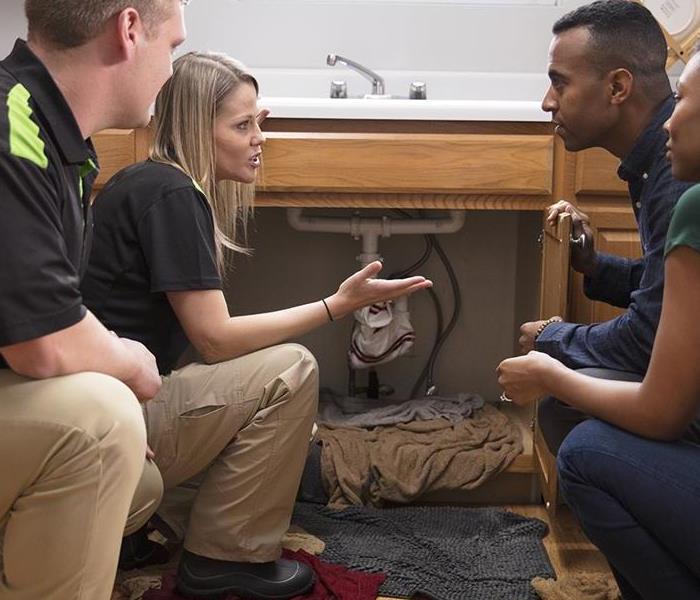Prevent Water Damage in Your Home
2/26/2020 (Permalink)
 If you find water damage in your home, call SERVPRO right away. Water restoration specialists are here 24/7 to help you clean up and recover fast!
If you find water damage in your home, call SERVPRO right away. Water restoration specialists are here 24/7 to help you clean up and recover fast!
Let's face it. Cleaning up and restoring your property from water damage is expensive. It can be a major disruption to your household while the cleaning and restoration team works to fix affected areas. If given a choice, no homeowner would choose to find water damage in their home.
Yet many homeowners ignore the simple things you can do to prevent this from happening to your home. The team here at SERVPRO of North Hollywood is certified, highly-trained and friendly. But if you'd prefer to avoid a visit from our water damage restoration specialists, here are a few ways you can protect your home and property.
Clean Gutters & Downspouts
Rain storms are rare events in Los Angeles. So rare that cleaning up from wildfires is a more frequent concern for many who live and work in the Southland.
Which makes preparing for rain all the more important for LA property owners who want to avoid a water removal emergency. If your gutters and downspouts can't drain storm water away from your home, water can pool near your foundation and seep into crawl spaces.
First, you'll want to clean the leaves, dirt and other debris out of your gutters. Do this annually in advance of Los Angeles' rainy season, which begins during Autumn and can extend through the Winter and into Spring.
Second, clean out the downspouts and make sure they are positioned to direct water away from your home. You may want to consider adding a downspout extension, which is flexible to allow you to redirect runoff in the preferred direction.
Check For Plumbing Leaks
Some plumbing leaks are easy to spot. Look and feel around sinks, tubs, toilets and appliances like refrigerators and washing machines. If you spot any damp areas, call a licensed plumber and have the leak fixed immediately.
Other plumbing leaks aren't as obvious. A leaky HVAC unit or water heater may not present signs of a leak to the naked eye. A burst pipe might be behind walls or buried underground.
You may have a hidden plumbing leak if you experience a sudden or surprising increase in your water bill. A drop in your water pressure is also a sign of leaks. A plumber that specializes in plumbing leak detection can test and find hidden water leaks so you can get them repaired.
Want to decrease the risk for plumbing leaks or overflows? Keep drain catchers in sinks and tubs to prevent hair and other larger debris from clogging pipes. And avoid pouring cooking grease into drains because the grease can solidify and create a blockage.
Seal Cracks & Store Keepsakes
Cracks around windows and doors allow drafts to flow in and out of your home, which raises your energy bill. They can also allow water to seep inside your house. Seal those up with caulk and replace the weather stripping to keep pests, pollution and storm water out.
You should similarly inspect the seals around tubs, toilets and sinks and fill those cracks too.
Last, but not least, consider storing important documents and mementos in water proof containers. That way, should the worst happen, you hopefully won't have to worry about losing something that's irreplaceable.
What to Do if You Find Water Damage
Of course, if water damage does strike you home, SERVPRO of North Hollywood is here to help. You can call on us 24/7. It is important to clean and dry the affected area quickly to mitigate the damage and prevent mold growth. We'll get to work extracting and drying the water, cleaning up the mess and repairing and restoring your property "Like it never even happened."
P.S. Bonus tip: find your water main shutoff valve and make sure you know how to use it. It's usually in a basement or crawl space or on the outside of the building. Shutting off the source is one of the first and best things a homeowner can do to mitigate damage from water to your home.





 24/7 Emergency Service
24/7 Emergency Service